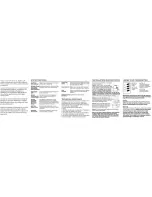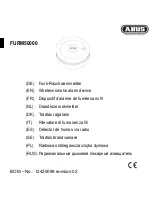
-1-
-2-
-3-
A
A
c
c
t
t
i
i
v
vation
switch
M
M
o
o
u
u
n
nting
plate
P
P
h
h
i
i
l
l
l
l
i
i
p
p
s
s
h
h
e
e
a
a
d
d
Ceiling
Thank you for purchasing our smoke alarm!
Please read these instructions carefully and store them in a safe place
where you can access them easily.
Product description and intended use
This is a smoke alarm with an optical sensor for installation in residential
buildings, apartments and rooms with residential-like use. Smoke alarms
are designed to provide an early warning of fire smoke and fires to
persons present, so that these persons can react appropriately to the
hazardous event. Always consult local regulations for smoke alarms.
Test button
Sound output
LED indicator
Product specifications
Detection method
: Optical
Power supply
: Sealed battery
Battery lifetime
: 10 years
Alarm volume
: > 85 dB (A) at 3 meters
Alarm sensitivity
: 0,096 - 0,148 dB/m
Monitored area
: 20 - 40 m²
Operating temperature
: 0 °C - 40 °C
Operating humidity
: < 93 %
Date of replacement
: See product label
Individual alarm indicator
: Yes
Alarm silence facility
: Yes | Hush time: 5-15 minutes
Low battery warning
: Yes
Low battery silence facility
: Yes | Hush time: 10 hours
Installation in leisure
accommodation vehicles
: Yes
Mounting location
: Ceiling
Interconnectable
: No
Warnings:
•
To prevent injury, this apparatus must be securely attached to the
ceiling in accordance with the installation instructions.
•
Batteries should not be exposed to excessive heat such as sunshine,
fire or the like.
•
Do not paint or cover the smoke alarm.
Where to install a smoke alarm
Smoke alarm must be installed in such a way that it can be reached
unhindered by the fire smoke so that fire can be reliably detected during
the development phase.
•
Install at least in sleeping areas (especially children's rooms);
•
Install at least in escape rooms;
•
In the middle of the ceiling of a room;
•
At least 50 cm away from the wall and other objects;
•
Maximum installation height of 6 meter.
Minimum
Optimal
Restrictions
Where to install a smoke alarm in rooms
with special geometries
•
Corridors with a maximum width of 3m: Max. 15m between 2 smoke
alarms. Max. 7,5m to the front side of the gallery and smoke alarms
at edges/crossings of corridors.
•
Rooms with sloping ceilings:
-
If the ceiling inclination is > 20° to the horizontal: Smoke
alarms must be installed at least 0.5 m and at most 1 m
from the ceiling top.
-
Partial roof slopes: If the flat ceiling is ≤ 1m wide, consider
as ceiling inclination is of > 20°. If the flat ceiling is >1m
wide, consider as flat ceiling.
•
Rooms with subdivided ceilings:
-
Height of the subdivisions is ≤ 0.2 m: Beams without consideration;
smoke alarm may be installed on the beams as well as on the
ceiling.
-
Height of subdivisions is > 0.2 m and area of ceiling panels > 36 m²
: Smoke alarm should be installed in each ceiling panel.
-
Height of subdivisions > 0.2 m and area of ceiling panels ≤ 36 m²
: Individual ceiling without consideration.
Where not to install a smoke alarm
•
In an environment with a high risk of draught (e.g. close to air
conditioning, fans and ventilation outlets). The movement of air can
impair the penetration of fire smoke into the smoke alarm.
•
Areas where occurs combustions regularly, such as kitchens.
•
Areas with high humidity such as bathrooms, or close to devices such
as dish washers or washing machines.
Activation
•
Before commissioning the smoke alarm, it is important to activate
and test it for correct operation.
•
Place the mounting plate on the smoke alarm and secure it by
turning it clockwise. When it’s properly tightened, the smoke alarm is
activated by the activation switch and generates a loud beep.
•
Test the correct activation of your smoke alarm by pressing the test
button. If no sound is generated, the smoke alarm is not activated
properly and should not be used!
Mounting
•
Remove the mounting plate from the smoke alarm;
•
Place the mounting plate on a desired installation location and mark
where the holes should be drilled;
•
Drill two holes with a diameter of 5 millimeters;
•
Push the plastic plugs into the holes;
•
Insert the screws into the mounting plate, and tighten them firmly into
the plugs;
•
Place the smoke alarm on the mounting bracket and secure it by
turning it clockwise;
•
When it’s properly tightened, the smoke alarm generates a beep;
•
Test the correct operation of your smoke alarm by pressing the test
button. If no sound is generated, the smoke alarm is not functioning
properly and should not be used!




















